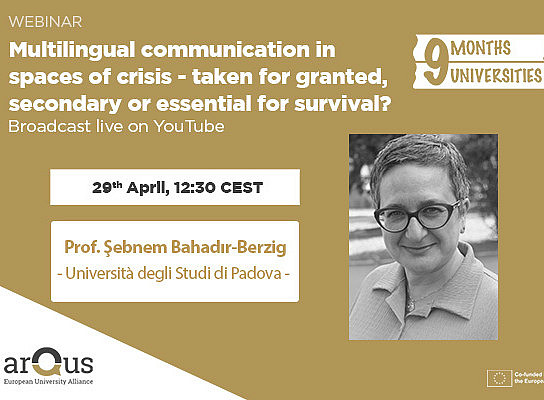Arqus invites academics and students to participate in the seventh webinar of the “9 Months, 9 Universities” series: “Multilingual communication in spaces of crisis – taken for granted, secondary or essential for survival?”, which will be broadcast live on the Arqus YouTube channel on 29th April 2024 at 12:30 CEST.
In her talk, Şebnem Bahadır-Berzig, Professor of Translation Studies at the University of Graz, will start out with an attempt at defining crisis within the framework of natural and human made disasters in linguistically and culturally diverse spaces. Then she will sketch out some exemplary scenarios of crisis with the focus on multilingual communication needs, dwelling especially on the role of human and nonhuman agents of communication and translation.
Professor Şebnem will discuss scenarios related on the one hand to immediate rescue and aid measures after natural disasters like earthquakes, but also on mental health care interventions in spaces of crisis, both against the background of (forced) migration and of natural disaster. In the end she will connect to a planned participatory research collaboration between members of the Arqus Alliance within a network of international researchers, non-governmental organizations, language mediation professionals, members of affected communities and community organizations from different countries.
Speaker
Şebnem Bahadır-Berzig is Professor of Translation Studies, Deputy Head of Department as well as Co-Speaker of the Research Area “Translation, Migration and Minorities” at the Department of Translation Studies and Co-Speaker of the Core Theme “Multilingualism, Migration and Cultural Transformation” at the Faculty of Humanities of the University of Graz. Her main research interests include pedagogy, politics and ethics of translation and interpreting, public service interpreting, health care interpreting, migration, transcultural communication and multilingualism.
Life on the Arqus YouTube Channel.
9 Months, 9 Universities is a new series of guest lectures that focus on specific topics related to language and culture and target mainly graduate and postgraduate students as well as early-stage researchers and lecturers interested in these topics. The lectures are intended to generate awareness and appreciation for the topic of multilingualism as well as an understanding of the many areas of our lives that are influenced by language.
